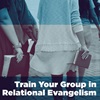The Emmaus Road narrative (Luke 24:13-35) invites us to consider the practice of Christlike listening as one aspect of our commitment to transforming community. Bonhoeffer points out,
The first service one owes to others in the fellowship consists in listening to them… . It is God's love to us that He not only gives us His Word but also lends His ear… . Christians so often think they must always contribute something when they are in the company of others, that this is the one service they have to render. They forget that listening can be a greater service than speaking.
While the practice of listening might seem a little "soft" and ill-defined when compared with more traditional small-group practices such as Bible study, prayer, and service, it helps to remember that the context for Bonhoeffer's observation was Christian brothers suffering together in a German concentration camp. Clearly this was a place where easy answers and superficial sentimentality would not do, but the "greater service" of true listening was most highly valued. Bonhoeffer drives the point home even further:
He who can no longer listen to his brother will soon be no longer listening to God either; he will be doing nothing but prattle in the presence of God, too… . One who cannot listen long and patiently will presently be talking beside the point and be never really speaking to others, albeit he be not conscious of it.
Present to God on Behalf of Others
Transforming community involves cultivating a kind of spiritual companionship that is very different from what we usually experience. It involves being present to the person we are listening to, yes, but even more importantly being present to God on the other's behalf. We are listening for what God's desire or guidance for that person might be, not what our best advice might be or how we can be most helpful. Furthermore, we are willing to be made aware of what is going on within ourselves so that our own inner urges (to fix, problem solve, alleviate discomfort) don't get in the way of what God wants to do in the moment.
The quality of presence can also be described as an intercessory prayer stance. The problem is that many of us have experienced intercession to be so effortful and exhausting that the word itself scares us away. However, the Scriptures assure us that it is the Holy Spirit who does the real work anyway—continually interceding for the saints (that would be us!) with groans too deep for words (Romans 8:26). Thus spiritual companionship can be understood as prayerful listening in which we remain quiet enough to listen for the prayer of the Holy Spirit that is already being prayed for that person before the throne of grace. We can ask God to give us some sense of what the Holy Spirit is already praying so we can participate in that prayer in whatever way God leads.
When asked by a friend how she prayed for others, Julian of Norwich described such prayerful companionship this way: "I look at God, I look at you, and I keep looking at God." What Julian is describing is a very freeing way to listen and be present to others. "Looking at God" (or Jesus) speaks to the idea that even before I start listening to another person, I can acknowledge the reality that both of us are in God's presence. I can pray that I will be sensitized to God's purposes in this person's life and in our conversation rather than being swayed by my own agenda. Then as I "look at you" and listen to you, I am not seeing you or experiencing our interaction simply in human terms. I am "listening through" to sense God's heart and God's prayer for you so that I can join God in that prayer. I am aware of myself and the other in God's presence, desiring only to be responsive to whatever God is doing in the moment.
Aware of Our Own Tendencies
Being aware of myself in God's presence means that I am also willing to be made conscious of my own inner dynamics, so I can be wise and refuse to allow anything that is going on within me to get in the way of what God might be doing. It means I am willing to set aside anything that might keep me from being fully present to God on the other's behalf. So for instance, if someone is sharing something wonderful that is going on in his or her life—a promotion, an unexpected opportunity, some experience that is full of joy and satisfaction—I might notice that it makes me feel a little jealous or competitive, and I am able to ask God to help me set aside feelings of jealousy in order to celebrate what God is doing.
Or perhaps someone is sharing a life experience that is similar to something I've experienced, and I become aware that I run the risk of projecting my own story and my own feelings onto them. When, by God's grace, I am aware of my own inner tendencies, I can ask God to help me set aside my projections in order to be fully present to what that person is experiencing and what God might be saying to them. This might be very different from how I would experience it or what God would say to me in a similar situation. As I cultivate such self-awareness, I might become aware of how uncomfortable I am with tears, strong emotions, or complicated life situations and can choose to resist the urge to say something—anything!—in order to alleviate that discomfort. I might even become aware of how I use humor to avoid being present with myself and others in the midst of the great unfixables of life.
"Looking at God again" means that once I have listened to the other person, I don't have to rush in with my own thoughts and words. Just as Jesus did with the disciples on the Emmaus Road, I can be still with that person and allow my silence to express reverent attention to what they have just shared. As I am present to God on the other's behalf, God may give a word to speak, a prayer to pray, a loving act to offer—or he may not. It could be that there are no words and we are guided to be silent with the other, allowing the Holy Spirit to pray with and for us as we are quietly together.
Creating a Safe Space for the Soul
As you can see, this is very different from the problem solving, advice giving, and attempts at bringing human comfort that often happen when Christian people are together. This kind of listening creates and protects a space between us that is hospitable to the soul—a place where it becomes safe enough to speak of our hopes and dreams, our longings and desires. In his book A Hidden Wholeness, Parker Palmer shares about a time when he was going through depression. He says, "When I went into a deadly darkness that I had to walk alone, the darkness called clinical depression, I took comfort and drew strength from those few people who neither fled from me nor tried to save me but were simply present to me."
Palmer's comments highlight one of the great paradoxes of human experience: in the deepest experiences of our lives—birth, death, depression, loss, calling, spiritual longing, and desire—we are profoundly alone. And yet there is something we as human beings can offer one another in the midst of that existential loneliness—the gift of our presence. Perhaps one of the reasons "simple presence" between human beings is so powerful is that it creates space in which the Ultimate Presence can be experienced as the Voice that speaks, the Love that comforts, and the Fullness that fills all emptiness.
Listening Like Jesus
Spiritual friendship and companionship characterized by this kind of intercessory prayer stance is at the heart of transforming community precisely because it creates so much space for listening to God in Christ through the ministry of the Holy Spirit. One writer describes this kind of companionship as "listening the other into free speech." I have pondered this phrase for a long time, for it strikes me as being so true and yet so hard to come by in the circles in which most of us live and work and fellowship. The author, Mary Sharon Moore, defines free speech not so much as a human right but as "an abiding interior freedom to speak the truth of one's being … freedom to be heard and received, freedom to hear and receive God's calling in my life." She distinguishes free speech from empty speech (endless, mindless chatter that fills every pocket of silence), false speech (which reveals a disconnection between one's inner self and outer response and betrays one's inner truth), and unfree speech (which reveals a sense of victimhood with phrases like "I can't …," "I should …," "I ought …," "I have no choice …").
Conversely, free speech
reveals the authentic self-in-God. Spiritually free speech honors the complexity and mystery of one's self and circumstances in life. In the presence of deep listening, the spiritually free person can speak the incongruence between one's poverties and God's love, one's sinfulness and divine mercy, one's small-heartedness and God's persistent generosity. Free speech is the hallmark of the spiritually mature and maturing person in the midst of spiritual paradox. Free speech reveals an interior centeredness in God and freedom to participate in the divine mystery as it unfolds in the course of one's life.
This may be at least one aspect of the kind of speech Paul refers to in Ephesians when he says, "Speaking the truth in love, we must grow up in every way" (4:15).
The description of one who is free to speak authentically of one's experience of God's presence (or seeming absence!) in the midst of one's real-life situation strikes me as an apt reflection of how Jesus listened the disciples into speech on the Emmaus Road. Even though he certainly had his perspective on the situation (which he shared fruitfully later on), his initial invitation to them was the complete freedom to tell it like it was for them. The goal of such listening is to lovingly and humbly evoke the freedom of others, to invite them into the fresh air and light of unjudged and unafraid expressions of who they are in God. Indeed, spiritual companionship begins as together we embrace basic guidelines for the particular kind of listening rather than assuming that we each know how.
Listening that evokes spiritually free speech in the other:
- Does not interrupt but rather creates space for the person to discover and express what they need to say
- Refrains from using evaluative phrases such as "Oh, that's good" or "How terrible!"—responses that merely communicate how we feel about what they are sharing, rather than giving them the opportunity to describe in depth how they are responding
- Waits on what the Spirit desires to reveal rather than rushing in with one's own thoughts and interpretations
- Asks questions that continually seek to unlock the deeper reality of the other person's experience, gently offering them permission to explore, own, and integrate their experiences into their spiritual experience—questions like "What was that like for you?" "How did you experience God (or not) in the midst of that experience?" "What happens when you pray about that?" "What questions does that raise for you?"
- Encourages the person toward mature faith—in other words, to discover God's presence and trust God's purposes in all aspects of life (and they themselves have to discover it; we cannot force this kind of insight on them)
- Invites the other into creative participation in God's redemptive purposes in the world: a greater connectedness with what God is doing in the world, a clearer sense of one's place in it, and a generous response to God's calling according to the gifts one has been given
As it turns out, this is exactly the kind of listening and speaking the disciples experienced on the Emmaus Road.
—Taken from Life Together in Christ by Ruth Haley Barton. Copyright 2014 by Ruth Haley Barton. Used by permission of InterVarsity Press, P.O. Box 1400, Downers Grove, IL 60515-1426.










